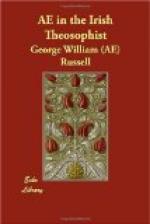of elemental being we inhabit, they syllable in shadowy
sound, out of old usage, the response, speaking of
a love and a hope which we know have vanished from
us for evermore. So hour by hour the scourge
of the infinite drives us out of every nook and corner
of life we find pleasant. And this always takes
place when all is fashioned to our liking: then
into our dream strides the wielder of the lightning:
we get glimpse of the great beyond thronged with
mighty, exultant, radiant beings: our own deeds
become infinitesimal to us: the colours of our
imagination, once so shining, grow pale as the living
lights of God glow upon them. We find a little
honey in the heart which we make sweeter for some
one, and then another lover, whose forms are legion,
sighs to us out of its multitudinous being: we
know that the old love is gone. There is a sweetness
in song or in the cunning reimaging of the beauty
we see; but the Magician of the Beautiful whispers
to us of his art, how we were with him when he laid
the foundations of the world, and the song is unfinished,
the fingers grow listless. As we receive these
intimations of age our very sins become negative:
we are still pleased if a voice praises us, but we
grow lethargic in enterprises where the spur to activity
is fame or the acclamation of men. At some point
in the past we struggled mightily for the sweet incense
which men offer to a towering personality: but
the infinite is for ever within man: we sighed
for other worlds and found that to be saluted as victor
by men did not mean acceptance by the gods.
But the placing of an invisible finger upon our lips
when we would speak, the heart-throb of warning where
we would love, that we grow contemptuous of the prizes
of life, does not mean that the spirit has ceased
from its labours, that the high-built beauty of the
spheres is to topple mistily into chaos, as a mighty
temple in the desert sinks into the sand, watched
only by a few barbarians too feeble to renew its ancient
pomp and the ritual of its once shining congregations.
Before we, who were the bright children of the dawn,
may return as the twilight race into the silence,
our purpose must be achieved, we have to assume mastery
over that nature which now overwhelms us, driving
into the Fire-fold the flocks of stars and wandering
fires. Does it seem very vast and far away?
Do you sigh at the long, long time? Or does
it appear hopeless to you who perhaps return with
trembling feet evening after evening from a little
labour? But it is back of all these things that
the renewal takes place, when love and grief are dead;
when they loosen their hold on the spirit and its sinks
back into itself, looking out on the pitiful plight
of those who, like it, are the weary inheritors of
so great destinies: then a tenderness which
is the most profound quality of its being springs up
like the outraying of the dawn, and if in that mood
it would plan or execute it knows no weariness, for




